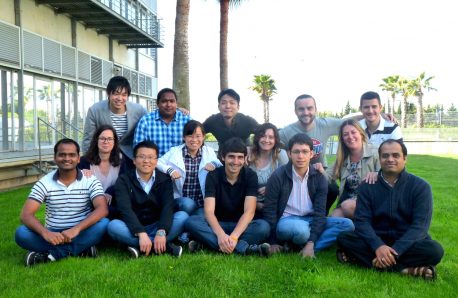Urakawa
Research group

Abstract
We develop novel heterogeneous catalysts and catalytic processes with the aim to minimize the energy usage and negative impacts of such processes on environment while achieving high product yield and selectivity. We take a multi-disciplinary approach based on material science, reaction engineering, and in situ / operando spectroscopy to gain solid comprehension of the active sites and the transformation pathways. Currently our major attentions are given to the conversion of CO2 and CO2-derived chemicals into fuels and useful chemicals and also to the production of hydrogen, the important molecule for CO2 reduction. Also, powerful in situ / operando spectroscopic tools for studying solid materials and gas-solid and solid-liquid interfaces are being developed and applied to shed light on catalytic reaction mechanisms.
Topics addressed
- Catalytic CO2 conversion
- High-pressure CO2 hydrogenation to methanol
- Combined CO2 capture and reduction in one process
- Photocatalytic water splitting
Articles
“High-pressure advantages in stoichiometric hydrogenation of carbon dioxide to methanol”
Journal of Catalysis (2016) 343, 127-132
Gaikwad, A. Bansode, A. Urakawa
“Enabling continuous capture and catalytic conversion of flue gas CO2 to syngas in one process”
Journal of CO2 Utilization (2016) 14, 106-111
F. Bobadilla, J. M. Riesco-García, G. Penelás-Pérez, A. Urakawa
“Unravelling the nature, evolution and spatial gradients of active species and active sites in the catalyst bed of unpromoted and K/Ba-promoted Cu/Al2O3 during CO2 capture-reduction”
Journal of Materials Chemistry A (2016) 4, 6878-6885
Hyakutake, W. van Beek, A. Urakawa
“Understanding synergetic effects of Zn and Rh–Cr promotion to wide-bandgap Ga, Ta and Ti oxides in photocatalytic water splitting”
Catalysis Science & Technology (2016) 6, 4243-4253
Bazzo, A. Urakawa
“Frequency analysis for modulation-enhanced powder diffraction”
Acta Crystallographica Section A (2016) 72, 500-506
Chernyshov, V. Dyadkin, W. van Beek, A. Urakawa
“Trends and Advances in Operando Methodology”
Current Opinion in Chemical Engineering (2016) 12, 31-36
Urakawa
“Integrated reduction and acid-catalysed conversion of furfural in alcohol medium using Zr,Al-containing ordered micro/mesoporous silicates”
Applied Catalysis B. Environmental (2016) 182, 485-503
M. Antunes, S. Lima, P. Neves, A. L. Magalhães, E. Fazio, F. Neri, M. T. Pereira, A. F. Silva, C. M. Silva, S. M. Rocha, M. Pillinger, A. Urakawa, A. A. Valente
“Gas Sensing Properties of In2O3 Cubes Prepared by a Hydrothermal Method”
Procedia Engineering (2016) 168, 247-250
Roso, T. Vilic, A. Urakawa, E. Llobet
“Synthesis of single crystalline In2O3 octahedra for the selective detection of NO2 and H2 at trace levels”
Journal of Materials Chemistry C (2016) 4, 9418-9427
Roso, C. Bittencourt, P. Umek, O. González, F. Güell, A. Urakawa, E. Llobet
“Synthesis of ZnO nanowires and impacts of their orientation and defects on their gas sensing properties”
Sensors and Actuators B: Chemical (2016) 230, 109-114
Roso, F. Güell, P. R. Martínez-Alanis, A. Urakawa, E. Llobet
“Decrease of the required dopant concentration for δ-Bi2O3 crystal stabilization through thermal quenching during single-step flame spray pyrolysis”
CrystEngComm (2016) 18, 2046-2056
J. A. H. Dreyer, S. Pokhrel, J. Birkenstock, M. Hevia, M. Schowalter, A. Rosenauer, A. Urakawa, W. Y. Teoh, L. Mädler